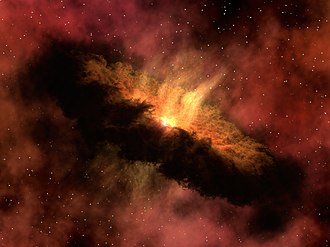Planet
Astronomical body orbiting a star

A planet is a celestial body that orbits a star, is massive enough to be rounded by its own gravity, and has cleared its neighboring region of planetesimals. The term "planet" is ancient, with ties to history, science, mythology, and religion. The planets were originally seen by many early cultures as divine or as emissaries of deities. As scientific knowledge advanced, the human perception of planets changed, incorporating a more scientific understanding of their nature.
Characteristics[edit]
Planets are generally divided into two main types: large, low-density gas giants and smaller, rocky terrestrial planets. There are also dwarf planets, which are similar to planets but have not cleared their orbital path.
Orbital Dynamics[edit]
Planets orbit stars in elliptical paths, with the star at one of the foci of the ellipse. The orbital period of a planet is the time it takes to complete one orbit around its star. This period is influenced by the planet's distance from the star and the star's mass.

Physical Properties[edit]
Planets vary widely in size, composition, and atmosphere. Terrestrial planets like Earth are composed primarily of rock and metal, while gas giants like Jupiter are composed mostly of hydrogen and helium. The axial tilt of a planet affects its seasons and climate.

Atmospheres[edit]
The atmosphere of a planet is a layer of gases surrounding it. The composition and thickness of a planet's atmosphere can vary greatly, influencing surface conditions and the potential for life. For example, Venus has a thick, toxic atmosphere, while Mars has a thin atmosphere.
Formation[edit]
Planets form from the protoplanetary disk of dust and gas that surrounds a young star. Over time, particles in the disk collide and stick together, forming larger bodies called planetesimals. These planetesimals can further coalesce to form planets.

Planetary Migration[edit]
During their formation, planets can migrate from their original orbits. This migration can be caused by interactions with the protoplanetary disk or with other planets. Such migrations can lead to the current arrangement of planets in a star system.

Exoplanets[edit]
Exoplanets are planets that orbit stars outside our Solar System. The study of exoplanets has expanded our understanding of planetary systems and the potential for life elsewhere in the universe.

Related pages[edit]
Ad. Transform your life with W8MD's Budget GLP-1 injections from $75


W8MD offers a medical weight loss program to lose weight in Philadelphia. Our physician-supervised medical weight loss provides:
- Weight loss injections in NYC (generic and brand names):
- Zepbound / Mounjaro, Wegovy / Ozempic, Saxenda
- Most insurances accepted or discounted self-pay rates. We will obtain insurance prior authorizations if needed.
- Generic GLP1 weight loss injections from $75 for the starting dose.
- Also offer prescription weight loss medications including Phentermine, Qsymia, Diethylpropion, Contrave etc.
NYC weight loss doctor appointmentsNYC weight loss doctor appointments
Start your NYC weight loss journey today at our NYC medical weight loss and Philadelphia medical weight loss clinics.
- Call 718-946-5500 to lose weight in NYC or for medical weight loss in Philadelphia 215-676-2334.
- Tags:NYC medical weight loss, Philadelphia lose weight Zepbound NYC, Budget GLP1 weight loss injections, Wegovy Philadelphia, Wegovy NYC, Philadelphia medical weight loss, Brookly weight loss and Wegovy NYC
|
WikiMD's Wellness Encyclopedia |
| Let Food Be Thy Medicine Medicine Thy Food - Hippocrates |
Medical Disclaimer: WikiMD is not a substitute for professional medical advice. The information on WikiMD is provided as an information resource only, may be incorrect, outdated or misleading, and is not to be used or relied on for any diagnostic or treatment purposes. Please consult your health care provider before making any healthcare decisions or for guidance about a specific medical condition. WikiMD expressly disclaims responsibility, and shall have no liability, for any damages, loss, injury, or liability whatsoever suffered as a result of your reliance on the information contained in this site. By visiting this site you agree to the foregoing terms and conditions, which may from time to time be changed or supplemented by WikiMD. If you do not agree to the foregoing terms and conditions, you should not enter or use this site. See full disclaimer.
Credits:Most images are courtesy of Wikimedia commons, and templates, categories Wikipedia, licensed under CC BY SA or similar.
Translate this page: - East Asian
中文,
日本,
한국어,
South Asian
हिन्दी,
தமிழ்,
తెలుగు,
Urdu,
ಕನ್ನಡ,
Southeast Asian
Indonesian,
Vietnamese,
Thai,
မြန်မာဘာသာ,
বাংলা
European
español,
Deutsch,
français,
Greek,
português do Brasil,
polski,
română,
русский,
Nederlands,
norsk,
svenska,
suomi,
Italian
Middle Eastern & African
عربى,
Turkish,
Persian,
Hebrew,
Afrikaans,
isiZulu,
Kiswahili,
Other
Bulgarian,
Hungarian,
Czech,
Swedish,
മലയാളം,
मराठी,
ਪੰਜਾਬੀ,
ગુજરાતી,
Portuguese,
Ukrainian